Posts by Christopher Lochhead
116 New Category of Human: “Native Digitals” (People Under 35) Are Radically Different People & Most “Native Analogs” Don’t Get It
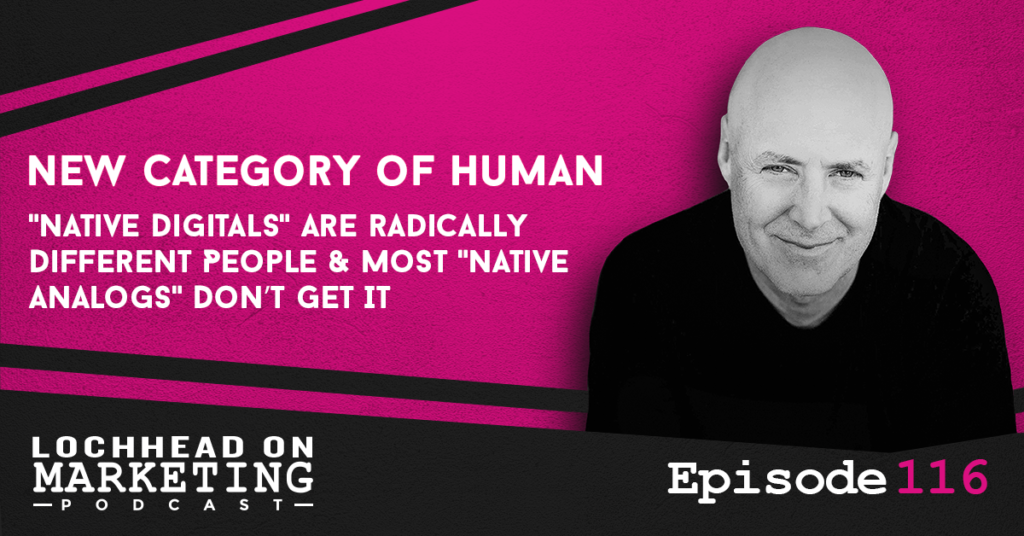
Podcast (lochheadonmarketing): Play in new window | Download (Duration: 15:07 — 10.4MB) | Embed
Subscribe: Apple Podcasts | Spotify | RSS | More
This episode is based on the Category Pirates ?☠️ Newsletter.
Welcome to a two-part series of Lochhead on Marketing, where we talk about Native Digitals and the profound changes they are bringing to the way we live, work, and play.
In this episode, let’s talk about how these younger folks, 140 Million of them in the United States, are the new category of human. These native digitals are the first to grow up completely integrated with technology.
I think it has a profound meaning, and I also think that most people aren’t paying attention.
Native Analogs vs Native Digitals: Perceiving Reality
While having my friends and their kids over one time, I’ve realized something different. While my friends and I are enjoying the beautiful sunset on the beach, the kids were doing something else. They were at their phones, talking to their friends or watching something online. Which seemed like a waste of a perfectly good sunset, though they did take a picture to post on social media.
This got me thinking and gave me the idea: these kids are Native Digitals. It means that their primary experience of life is within the digital one, and their analog life is secondary. That is to say, the photo or video of the sunset is more important than the actual one, because they can show it off to their network.
If you are like me, a Digital Analog, it’s the reverse. Though the insight that I had that morning after that sunset on the beach was quite interesting.
Who are the Native Digitals and Native Analogs?
If you are 35 and above, you are most likely a Digital Analog. You value your life outside technology, and are one of the categories of human that exists today. If we are talking about generations, they fall under the Baby Boomers and Gen Xers who were born in the early 80s or earlier. They make up approximately 136.8 million Americans.
The second category are the Native Digitals. These are millennials and Gen Xers who are born between the early eighties and as recently as the 2010s. The high end of these folks are around thirty-five today and the low end are as young as six years old.
Get this, they make up 140 million Americans.
Why is this Important?
So there’s the great AHA. There are more Native Digitals right now in the United States. As time goes on, the gap between the population of Native Digitals and Native Analogs will widen.
Yet it is our strong suspicion that both category of humans does not understand how profound this change is. It’s not just a normal generation stuff where the older generation has different trends than the newer one.
One major difference is that Native Analogs think of technology as an add-on to their lives, and sometimes even a distraction. Whereas Native Digitals grew up where technology is a necessity and deeply tied to their daily lives. Hence why they think their digital lives and personas are more valuable than their physical ones.
So why is this important? Because some of the biggest companies that are trying to appeal to Native Digitals are being run by Native Analogs. This causes a disconnect in their ideas, and might hurt their company in the long run, either by further showing their lack of comprehension. Or worse, being late to the punch in creating new categories that appeal to these new humans.
It also extends to their company framework. While there are still benefits to having a physical office or venue for work, stubbornly clinging to a full office experience can be detrimental. Especially since the current situation has proved that working remotely is not only viable, but sometimes better.
These are just some of the things to consider, and we would love to tackle it more in the 2nd part of these series.
So think about this the next time you are looking into the sunset on a sandy beach: which type of human are you?
Bio
Christopher Lochhead is a #1 Apple podcaster and #1 Amazon bestselling co-author of books: Niche Down and Play Bigger.
He has been an advisor to over 50 venture-backed startups; a former three-time Silicon Valley public company CMO and an entrepreneur.
Furthermore, he has been called “one of the best minds in marketing” by The Marketing Journal, a “Human Exclamation Point” by Fast Company, a “quasar” by NBA legend Bill Walton and “off-putting to some” by The Economist.
In addition, he served as a chief marketing officer of software juggernaut Mercury Interactive. Hewlett-Packard acquired the company in 2006, for $4.5 billion.
He also co-founded the marketing consulting firm LOCHHEAD; the founding CMO of Internet consulting firm Scient, and served as head of marketing at the CRM software firm Vantive.
We hope you enjoyed this episode of Lochhead on Marketing™! Christopher loves hearing from his listeners. Feel free to email him, connect on Facebook, Twitter, Instagram, and subscribe on Apple Podcast! You may also subscribe to his newsletter, The Difference, for some amazing content.
225 Everybody Wants To Rule The World with #1 Tech Analyst Ray Wang, Chairman of Constellation Research
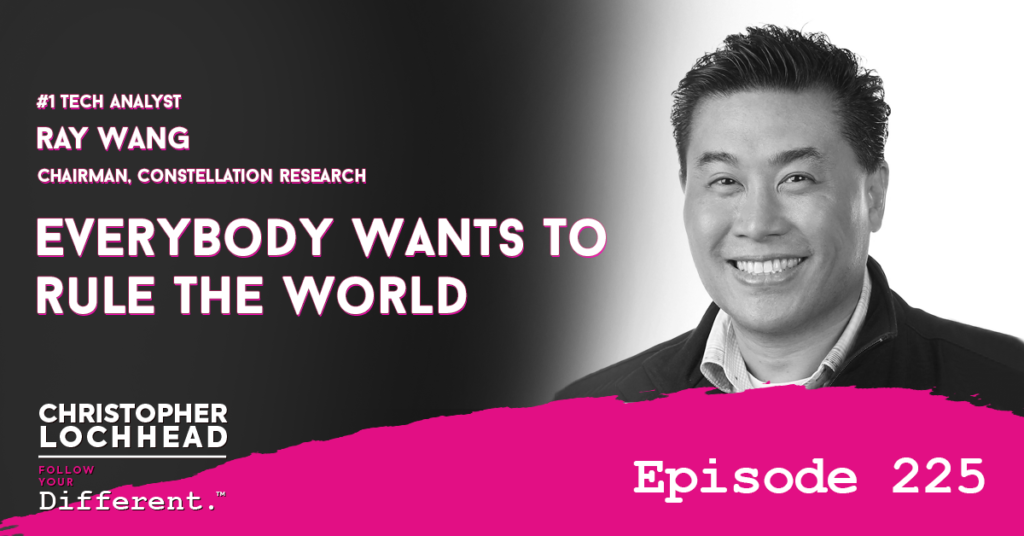
Podcast: Play in new window | Download (Duration: 1:03:36 — 43.7MB) | Embed
Subscribe: Apple Podcasts | Spotify | Pandora | RSS | More
In this episode of Follow Your Different, Ray Wang is back to talk about how to survive and thrive in a world of Digital Giants.
Ray Wang is the world’s number one Tech Analyst, and the founder of Constellation Research. He has a brand-new book called Everybody Wants to Rule the World: Surviving and Thriving in a World of Digital Giants. We talk about the points he wrote in the book, as well as other recent tech-related events and breakthroughs. This is a fascinating conversation with one of the smartest guys in tech, so you wouldn’t want to miss this episode.
Tech Breaches and Cybersecurity
When asked on the recent tech security breaches, Ray comments how we are vulnerable at the moment. It seems the current tech for protection available to the public is vastly outpaced by these breachers.
As to why these tech breaches keep happening, Ray quotes the Willie Sutton Rule: “Because that’s where the money is.”
He also thinks it is scary that if it is occurring here in the US, then how about other countries that might have less defense mechanisms in place? While you can expect corporations to have systems in place to counter that, it can be harrowing for smaller companies.
Ray’s advice is that your company should always have a back disaster recovery ready to go. So if your company was unlucky enough to get hit these breachers and ransomware hackers, you can just revert your system using that backup. You might lose a few hours work due to it, but it’s better than succumbing to these malicious entities.
Ray Wang: Everybody Wants to Rule the World
Ray shares that when you think Digital Giants, you think large corporations. While large corporations can be Digital Giants, the reverse is not always true. It’s not about the size or the market that the company dominates, it goes a bit deeper than that.
With the cost of access to fast internet and tech becoming cheaper by the minute, more people are swarming the net as we speak. One commodity that is often overlooked when moving around the web is your personal information.
“First thing is, you have to believe in the fact that your personal data, genomics, and digital exhaust should all be property rights. The reason that’s important is because we have laws that talk about how you treat and give consent to property. Land rights, invention, IP and trademarks, right?
The good news is property laws exist. And in every state, country, and jurisdiction, you just have to say, “look, your personal data is a property, right?” And if somebody wants to use it, you need their consent. Suddenly, boom, you actually now have a whole economy around data. You’ve actually put the ownership of data back in the hands of the people that are creating that data.” – Ray Wang
So why is this important? Because for something that should be property, we seem to be giving it away easily in exchange for simple access. These Digital Giants then use that information to further benefit on our behalf, turning you into a product rather than a user.
Amazon, the Ultimate Digital Giant
Ray elaborates further by comparing Facebook and Google, and how these two Digital Giants operate. What’s fascinating is how Google is often perceived as the good guy, while Facebook is the bad one. When in truth, both giants have the same aim, it’s just that their delivery varies.
While talking about these two giants, Ray brings up the ultimate digital giant, Amazon. Why is it the ultimate digital giant? Unlike Facebook and Google, who are focused on one or two aspects to dominate in, Amazon seems to have its fingers dipped into multiple cookie jars.
“Amazon is the ultimate digital giant. I mean, it’s got ads. It’s got search. It even has subscriptions via memberships and prime. It’s got the goods and the services and their own network that’s on the back end. So that’s really what’s going on. We see a rise of these things called Digital Giants that have dominated markets, but they’re battling each other out for every digital monetization model there is.” – Ray Wang
Want to learn more from Ray and how to thrive in the world of Digital Giants? Download and listen to this episode.
Bio
R “Ray” Wang (pronounced WAHNG) is the Founder, Chairman, and Principal Analyst of Silicon Valley based Constellation Research Inc. He co-hosts DisrupTV, a weekly enterprise tech and leadership webcast that averages 50,000 views per episode and authors a business strategy and technology blog that has received millions of page views per month. Wang also serves as a non-resident Senior Fellow at The Atlantic Council’s GeoTech Center.
Since 2003, Ray has delivered thousands of live and virtual keynotes around the world that are inspiring and legendary. Wang has spoken at almost every major tech conference. His ground-breaking bestselling book on digital transformation, Disrupting Digital Business, was published by Harvard Business Review Press in 2015. Ray’s new book about Digital Giants and the future of business titled, Everybody Wants to Rule the World will be released July 2021 by Harper Collins Leadership.
Wang is well quoted and frequently interviewed in media outlets such as the Wall Street Journal, Fox Business News, CNBC, Yahoo Finance, Cheddar, CGTN America, Bloomberg, Tech Crunch, ZDNet, Forbes, and Fortune. He is one of the top technology analysts in the world.
Links
Follow Ray today!
Website: RayWang.org
Twitter: @RWang0
LinkedIn: in/RWang0
Check out Ray Wang’s latest Book: Everybody Wants to Rule the World
We hope you enjoyed this episode of Follow Your Different™! Christopher loves hearing from his listeners. Feel free to email him, connect on Facebook, Twitter, Instagram, and subscribe on iTunes!
115 2 Legendary Questions (Part 2)
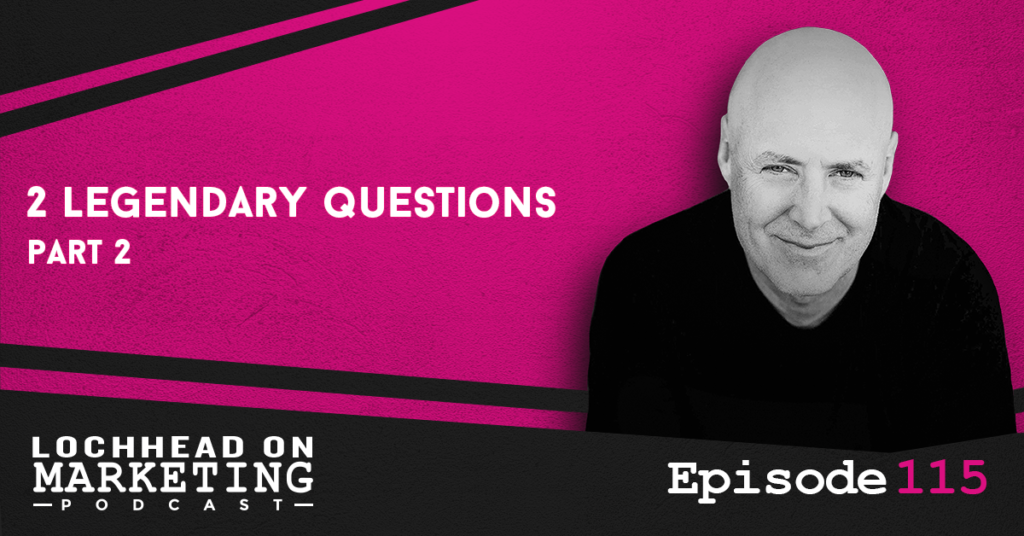
Podcast (lochheadonmarketing): Play in new window | Download (Duration: 9:34 — 6.6MB) | Embed
Subscribe: Apple Podcasts | Spotify | RSS | More
Welcome to a special two-part series of Lochhead on Marketing, where I answer two of the most important questions in my life and career. If you haven’t listened to Part 1 yet, give it a listen here: 2 Legendary Questions (Part 1). Go on, we’ll wait.
Now that you’re all set, here’s part two. Let’s go!
The Legendary Question at the End of a Conversation
If you are an avid listener of Follow Your Different, you have heard me ask this question multiple times. An old friend and mentor of mine named George Brown got me into asking the same question. It goes like this:
“Is there anything else?”
Now, why is that a powerful question, you might ask? First of all, if you went to Sales School, you know that there are two kinds of questions if you look at things on a higher level. There’s open probes and closed probes. A closed probe is a question designed to get a specific answer, while an open probe sort of leaves it to the one that was questioned.
If you listen to me on Follow Your Different, I tend to ask more open questions. Those are all open probes and they’re designed to elicit a lot of information. So generally, when you ask an open probe, hopefully you’ll get more information from the person you’re in communication with.
Is There Anything Else?
Now, as to why this particular question is so powerful in a conversation, particularly at the end, it’s like this:
Often in any conversation, you get the most powerful information at the end. So when you ask someone if there is anything else, what you’re really saying to them is, “Hey, anything else on your mind?” This can elicit a feeling that they might not have given enough information before, and so it opens them up to share more, which you can then follow up with some close probing questions specific to the new information.
You will notice how often that question blows something wide open and when it does.
It’s also a good way to keep the conversation focused on a topic you might be interested in continuing the conversation on, rather than getting sidetracked by another topic. Particularly when the person turns the table and tries to turn the tables on you.
All right. That’s our two-part series on Legendary Questions, starting with “Is this legendary work?”/ “Do you think this is legendary work”, and finishing with “Is there anything else?” I hope you put these two legendary questions to good use.
Bio
Christopher Lochhead is a #1 Apple podcaster and #1 Amazon bestselling co-author of books: Niche Down and Play Bigger.
He has been an advisor to over 50 venture-backed startups; a former three-time Silicon Valley public company CMO and an entrepreneur.
Furthermore, he has been called “one of the best minds in marketing” by The Marketing Journal, a “Human Exclamation Point” by Fast Company, a “quasar” by NBA legend Bill Walton and “off-putting to some” by The Economist.
In addition, he served as a chief marketing officer of software juggernaut Mercury Interactive. Hewlett-Packard acquired the company in 2006, for $4.5 billion.
He also co-founded the marketing consulting firm LOCHHEAD; the founding CMO of Internet consulting firm Scient, and served as head of marketing at the CRM software firm Vantive.
We hope you enjoyed this episode of Lochhead on Marketing™! Christopher loves hearing from his listeners. Feel free to email him, connect on Facebook, Twitter, Instagram, and subscribe on Apple Podcast! You may also subscribe to his newsletter, The Difference, for some amazing content.
224 The Power of Trust with Harvard Business School Professor Sandra Sucher
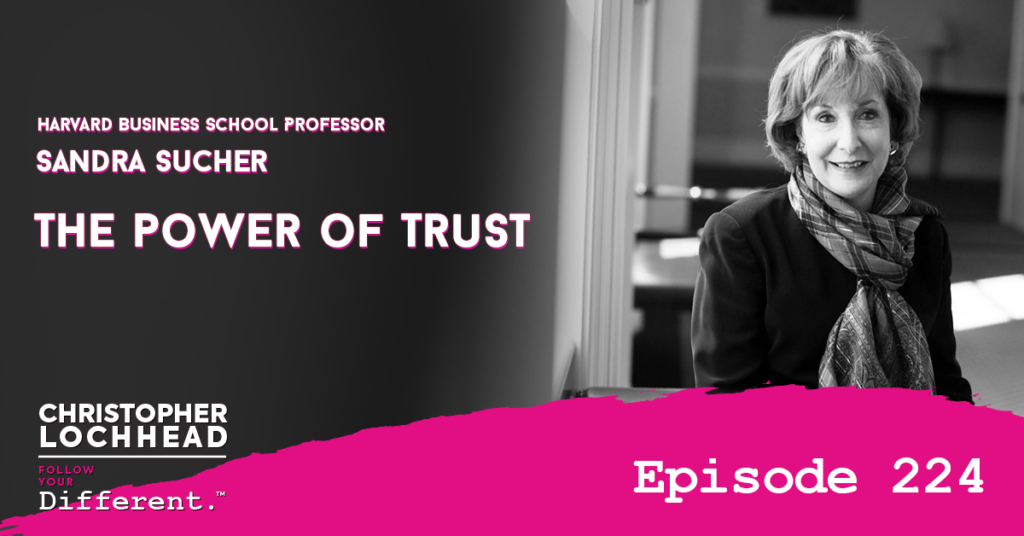
Podcast: Play in new window | Download (Duration: 1:16:22 — 52.4MB) | Embed
Subscribe: Apple Podcasts | Spotify | Pandora | RSS | More
Trust is a cornerstone of society. It’s the seminal component that’s required for everything to work, including everything in business. Professor Sandra Sucher says that trust at every level of business and society has never mattered as much as it does right now.
In this episode of Follow Your Different, Professor Sandra Sucher talks about The Power of Trust, and how companies could earn, lose, and regain people’s trust. So if you are interested in learning about the different levels of trust across different levels in business, stay tuned to this episode.
Why Trust is Important
When asked what she thinks is the most important thing to learn about trust, Professor Sandra points out that it is important to know that trust is a type of relationship. It’s a relationship of almost like trusting your vulnerabilities to another person and believing in their actions.
While not entirely quantifiable, this insight makes us aware of how we should handle trusting another person, whether in business or in our daily lives.
“This is not like terra incognita, to any of us. And it says the trust is something you can get your arms around. It’s not ether, nor magic. And it’s not fairy dust. It’s resolved.” – Professor Sandra Sucher
Knowing this, we now have an idea as to where to think about how we can become a trustworthy person.
Culture and Trust in the Company
One of the things Professor Sandra have found in their research is that developing culture in a company is also based on trust.
People often associate culture as a kind of reputation management, more on handling how people think about them and the company. Though it’s better defined as building trust from within. When the people in your company trust the management and the company, they will be more invested in making it better. They trust that the company is doing its best, so they should do their best as well.
“So if you don’t have trust inside the company, kiss it goodbye. It’s not going to get it outside the company.” – Professor Sandra Sucher
Trust is a Judgement Call
Professor Sandra also defines trust as a judgement call people make, based on different factors that they perceive from someone. In terms of business, it could be with regards to their competence, their motives, and whose interests they are serving, among other things.
Another thing to note is that people also focus on how companies treat their people. So it’s not just about getting results. How you accomplish your goals also matter.
Professor Sandra thinks that one of the key things that set them apart from other research is their focus on Impact. While that previous point pertains to knowing how they interact with equals and those who work below them, a person or company’s impact pertains to how they affected others with their actions, whether directly or indirectly. This is quite important because then, you are basing your judgement on actual experience rather than information from second to third hand information.
With all this information, at hand, we make our judgement call. Are they competent? Do they care about other people’s interest? Have their actions impacted you in some way? If that was the case, did they take accountability for unintended impacts?
So while you can’t entirely quantify how Trust can be gain or lost by a company, having these parameters to have an estimate is a great way of gauging the current level of trust.
To learn more about Professor Sandra Sucher and The Power of Trust, download and listen to this episode.
Bio
Sandra Sucher
Sandra Sucher is a professor of management practice at Harvard Business School, where she has been teaching for the last twenty years. She’s an advisor to the Edelman Trust Barometer, and has spoken about trust at Edelman and numerous companies and at Harvard Business School events.
She provides expert commentary for Bloomberg, The New York Times, The Washington Post, The Wall Street Journal, NPR and Fortune.
Prior to teaching at Harvard, Sucher had a two-decade career as a senior level executive and business ‘fixer,’ specializing in uncovering complex organization problems and creating new ways to address them.
She lives in Massachusetts.
Links
Learn more about Sandra: Harvard Business School Profile
LinkedIn: in/Sandra-Sucher
Twitter: @SandraSucher
Check out her new book: The Power of Trust
We hope you enjoyed this episode of Follow Your Different™! Christopher loves hearing from his listeners. Feel free to email him, connect on Facebook, Twitter, Instagram, and subscribe on iTunes!
114 2 Legendary Questions (Part 1)
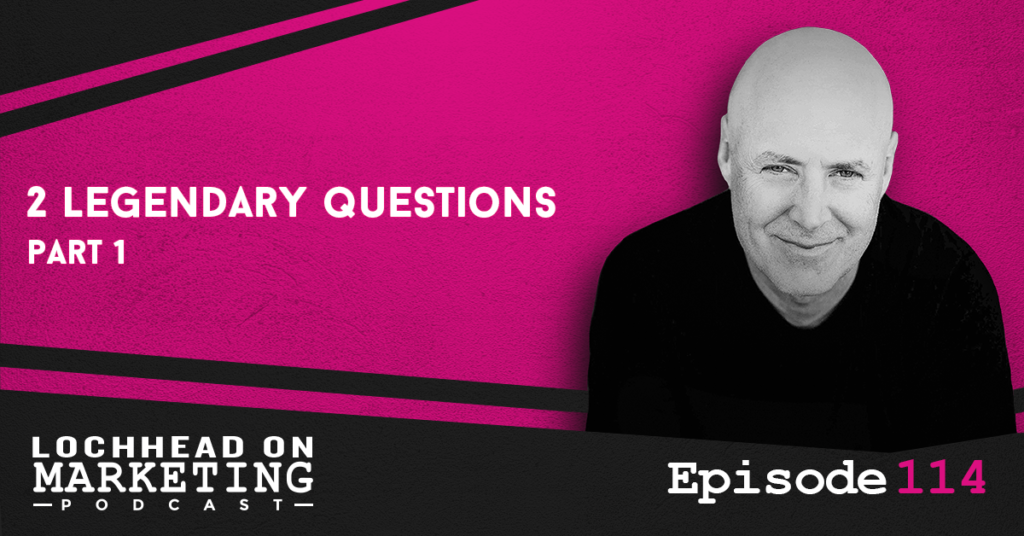
Podcast (lochheadonmarketing): Play in new window | Download (Duration: 10:32 — 7.2MB) | Embed
Subscribe: Apple Podcasts | Spotify | RSS | More
Welcome to a special two-part series of Lochhead on Marketing, where I answer two of the most important questions in my life and career. Are you curious as to what those questions are? Stay tuned to find out.
My Favorite Question to Ask
You need a bit of back story for the first question.
In 2006, I was the head of marketing for a software company called Mercury Interactive. By June of that year, we sold the company for Hewlett-Packard for 4.5 billion dollars, which was a sizeable amount back then.
So as part of the transition to HP, our team met with the team in charge of marketing for the announcement of the acquisition. The marketing strategy was being handled by a famous ad agency; one you’d probably recognize if I describe one of their projects.
After we made our introductions, the head of HP marketing asked me if I had any questions before they start with the presentation. So I asked them a question:
“Do you think what you are about to show us is legendary work?”
That question made them pause for a bit, and the head of said ad agency looked at the head of HP marketing and said, “Can we have two more days?”
Good on them for realizing that they could do better, but it would’ve been better if they gave it their 100% in the first place.
Setting the Bar High
So one of my favorite questions to ask at the beginning of any meeting where somebody is about to show you something. On this case, it was ad creative, but it could be anything. It could be a product prototype, a marketing plan, or a category design. It could even be the justification for why we should buy Company X.
Whatever the thing is that they’re about to present, my favorite question to ask before that is, do you think this work? That is to say, the work they’re about to show is legendary.
What I learned over time is if you want to set a high bar for excellence in your organization, it’s interesting to find out where other people’s bar for excellence is. Because if they don’t bother to show you their best or legendary self, then why would you want to see it?
Now, it’s a different situation when you have something that is a work in progress, and need help in making it legendary. In which case, I ask this question instead: “Do you think we’re off to a legendary start?”
Though if you are presenting something that you think is final or close to the final work, you’ll always get the same question from me:
“Do you think this is legendary work?”
If you want to learn more about my two legendary questions, listen to this episode and check out part two coming soon!
Bio
Christopher Lochhead is a #1 Apple podcaster and #1 Amazon bestselling co-author of books: Niche Down and Play Bigger.
He has been an advisor to over 50 venture-backed startups; a former three-time Silicon Valley public company CMO and an entrepreneur.
Furthermore, he has been called “one of the best minds in marketing” by The Marketing Journal, a “Human Exclamation Point” by Fast Company, a “quasar” by NBA legend Bill Walton and “off-putting to some” by The Economist.
In addition, he served as a chief marketing officer of software juggernaut Mercury Interactive. Hewlett-Packard acquired the company in 2006, for $4.5 billion.
He also co-founded the marketing consulting firm LOCHHEAD; the founding CMO of Internet consulting firm Scient, and served as head of marketing at the CRM software firm Vantive.
We hope you enjoyed this episode of Lochhead on Marketing™! Christopher loves hearing from his listeners. Feel free to email him, connect on Facebook, Twitter, Instagram, and subscribe on Apple Podcast! You may also subscribe to his newsletter, The Difference, for some amazing content.
223 How To Produce Breakthroughs With “Alien Thinking” with Dr. Michael Wade
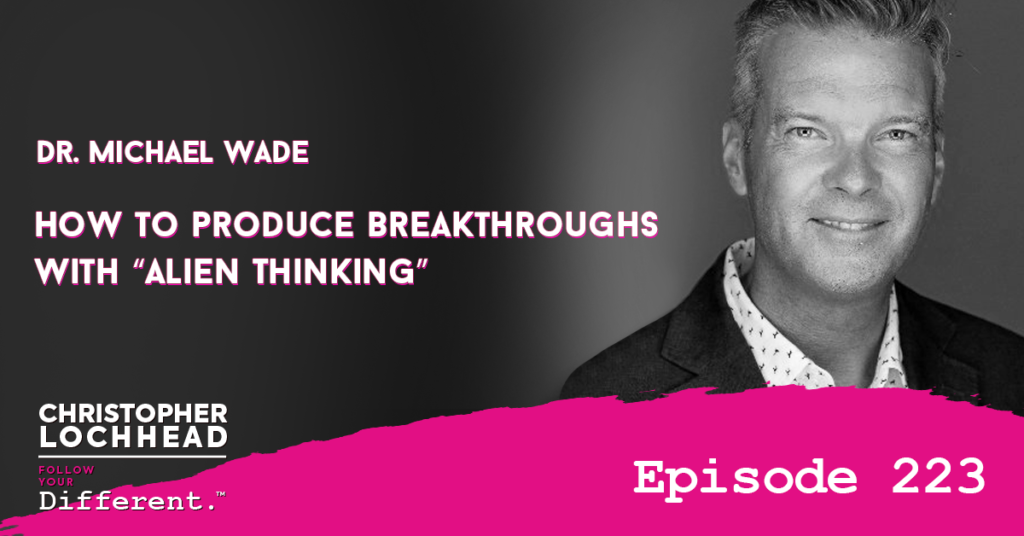
Podcast: Play in new window | Download (Duration: 59:08 — 40.6MB) | Embed
Subscribe: Apple Podcasts | Spotify | Pandora | RSS | More
We are living at a time where the world needs breakthroughs more than ever. People who want to develop the ability to create a different future have never been more in demand. Though in order to do this, we need models and framework, as well as ideas and inspiration to help create those breakthroughs in our lives and businesses.
In this episode of Follow Your Different, Dr. Michael Wade shares with us on how to see the world with fresh eyes and the power of different thinking. He also explains how to navigate such that your breakthroughs can actually come to life, and so much more!
Professor Michael Wade’s new book, Alien Thinking, blows open much needed research and insight in this regard. ALIEN is actually an acronym that he and his co-authors came up with, and it stands for Attention, Levitation, Imagination, Experimentation, and Navigation. If you want to know the story behind it, stay tuned to this episode.
The Definition of a Breakthrough
The conversation starts of by establishing their definition of a breakthrough. When talking about a breakthrough, Dr. Mike thinks that it should be something a large improvement, or something that hasn’t been done before. It has to be enough to take something to the next level.
“It’s not just having an idea, which is hard enough. It’s about taking that idea and kind of break through the process to become a breakthrough solution.” – Dr. Michael Wade
Which is not to say that small changes and incremental innovation is bad. They are great for optimizing those big breakthroughs you have further down the line. It can also help you reach some short-term goals for yourself. Dr. Mike just chooses to focus on studying and looking an eye out for breakthrough innovations.
Exponential Breakthroughs are Harder to Reach
When asked why people seem to find it easier to go incremental than exponential, Dr. Mike thinks that we are simply not built for it. It takes extra effort to break away from the norm and challenge our usual assumptions about how things are done.
If you can’t even bring yourself to challenge those assumptions and preconceptions, making a breakthrough will just be a pipe dream.
ALIEN Thinking with Dr. Michael Wade
Dr. Mike talks about how they try to break down what it means to do something original in an original way. This is because having an exponential or radical innovation often requires being original.
Which is why the title of the book, Alien Thinking, fits so well with the idea. Aside from the acronym it stands for, the metaphor of the alien can help you see things in a fresh perspective.
“Every day, we go through life without really questioning things after a while. So what we’re challenging people to do when they read the book is to see the world like an alien, and see things for the very first time without preconceived notions about the way things should work. So a lot of what we talked about in the book is about is about how to do that how to regain that ability to see things in, in new ways with fresh eyes.” – Dr. Michael Wade
To hear more from Dr. Michael Wade and how to see the world through Alien Thinking, download and listen to this episode.
Bio
Michael Wade is a Professor of Innovation and Strategy at IMD and holds the Cisco Chair in Digital Business Transformation.
He is the Director of the Global Center for Digital Business Transformation.
His areas of expertise relate to strategy, innovation, and digital transformation.
He obtained Honours BA, MBA and PhD degrees from the Richard Ivey School of Business, University of Western Ontario, Canada. Previously, he was the Academic Director of the Kellogg-Schulich Executive MBA Program.
Michael has been nominated for teaching awards in the MBA, International MBA, and Executive MBA programs.
RESEARCH AND THOUGHT LEADERSHIP
Michael has published works on a variety of topics, including digital business transformation, innovation, strategy, and digital leadership. He has published nine books, more than a hundred case studies and articles, and appears frequently in the mainstream media. One of his articles was among the top 20 cited articles in business, management and accounting worldwide for five years, according to Scopus (the largest abstract and citation database of peer-reviewed literature).
His Latest book, published in 2019, is Orchestrating Transformation: How to Deliver Winning Performance with a Connected Approach to Change. His previous book, 2016’s Digital Vortex: How Today’s Market Leaders Can Beat Disruptive Competitors at their Own Game won multiple awards and has been translated into five languages.
Professor Wade has been named one of the top ten digital thought leaders in Switzerland three times by Bilanz, Le Temps, and Handelszeitung, most recently in 2020.
CLIENTS & INDUSTRY EXPERIENCE
At IMD, Professor Wade directs a number of executive programs related to digital transformation, including Digital Execution, Digital Transformation for Boards, and Digital Disruption. He also founded and directs Europe’s first and largest program for executives on digital, Leading Digital Business Transformation.
He has directed custom programs related to strategy and digital business transformation for Vodafone, AXA, Tetra Pak, Honda, Gazprom, Credit Suisse, and Cartier, among others. Michael provides consulting services, executive education, and expert evaluations to several public and private sector organizations on strategy and digital transformation.
He sits on a number of corporate boards as an advisor on digitization and business model disruption. He has lived and worked in Britain, Canada, Japan, Norway, Costa Rica, and Switzerland.
Links
LinkedIn: in/MichaelWade
We hope you enjoyed this episode of Follow Your Different™! Christopher loves hearing from his listeners. Feel free to email him, connect on Facebook, Twitter, Instagram, and subscribe on iTunes!
113 Are you Crazy or Mission Driven? Musing on Play Bigger’s 5th Anniversary
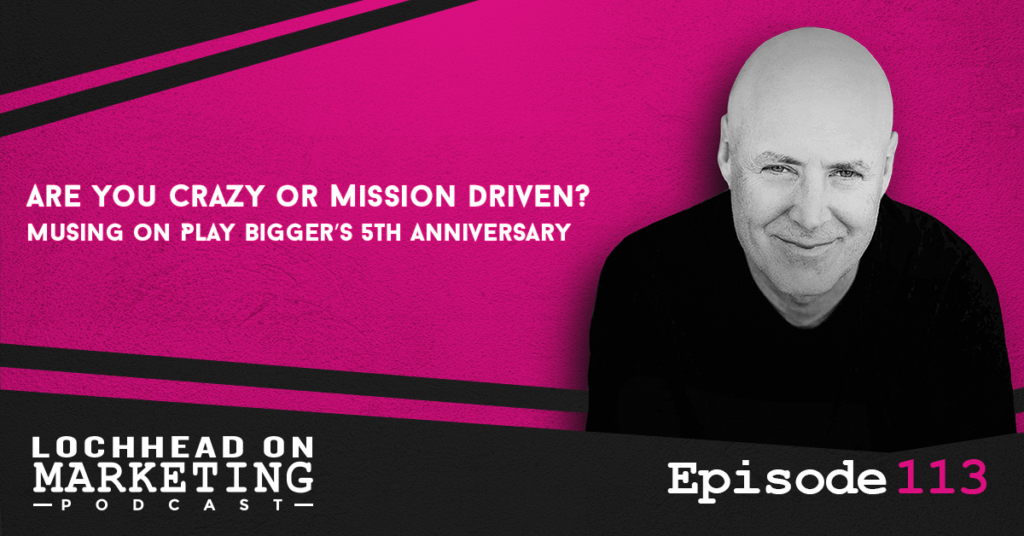
Podcast (lochheadonmarketing): Play in new window | Download (Duration: 14:21 — 9.8MB) | Embed
Subscribe: Apple Podcasts | Spotify | RSS | More
Welcome to this very special episode of Lochhead on Marketing, on what is the week of Play Bigger, my first book’s fifth anniversary of publication.
Recently on Follow Your Different, we had on Captain Paul Watson, who is the co-founder of Greenpeace and the founder of Sea Shepherd. Sufficed to say, Captain Paul is vey mission driven. Some would call him a saint, while others call him an eco-terrorist. What I could tell you for sure is that Captain Paul, like almost every other legendary person, is “kind of crazy”.
We also want to share with you something that Churchill famously said, and that is to “Never give up on something you can’t go a day without thinking about”. Now, what Churchill didn’t say is what you should do if the thing that you can’t stop thinking about makes you batshit crazy.
Even worse, what do you do if the thing that you can’t stop thinking about isn’t really something that you think about? It’s something that thinks you that is to say, it owns you.
So in this episode of Lochhead on Marketing, the fifth anniversary of Play Bigger coming out, let’s talk about the difference between being passionate and possessed and what that means.
What Comes After Thinking It
Churchill once said,
“Never give up on something you can’t go a day without thinking about.”
What he didn’t say is what you should do if that thing drives you nuts. Is this thing that’s driving you nuts? The difference between choosing a passion and being possessed? Now that you’re thinking about it, what if you really can’t stop thinking about it all the time?
In the end, all you could do is embrace it and call it your own. What happens after that? What happens if when you share it with people eight out of 10 times, they think you’re nuts or you fail? Now imagine if that something causes you to fail 8 times out of 10 for 30 years, then what do you do?
It’s daunting, right? So what if I tell you that this is a big part of my story?
For me, my something was Category Design. This week is actually the 5th anniversary of my book Play Bigger, which introduced Category Design to the world. What I have rarely talked about is the fact that Play Bigger was my last-ditch effort to try to make category design land. It was my last effort to try to make it have value and impact at any kind of scale for entrepreneurs, for creators, for innovators of any kind.
I figured it would fail. I didn’t want it to fail, but I figured it would be because 30 years of a two hundred batting average would kind of give that to you. Well, it turns out Play Bigger didn’t fail. If you read it or shared it, I want to thank you very much, because your efforts put Play Bigger into the top one percent of books in the business book category.
There is No Cheat to Success
I wish I could tell you that having a legendary product will automatically lead it to success. It doesn’t. This was also the case when I talked about Category Design before. Entrepreneurs and other business leaders would either misinterpret it as just another marketing or watered-down messaging, which is actually one of my least favorite words in marketing.
What also irked me is when Hustle Porn Stars sell you the idea of how to be successful instantly. You just need to follow X, Y, and Z to achieve your goals.
Based on experience, it never is as easy as that. Take it from someone who fell for it and have learned his lesson the hard way.
“There is no shortcut to success. There’s no such thing as a 4-hour work week. All that stuff about hacks and hustle porn, motivational garbage is a lie, and I’m no liar.” – Christopher Lochhead
Sure, there are some people who get born rich or born beautiful and there are some people who win the lottery. But success in life is not about that. So I wanted to share with you what it really took, what it took to make Play Bigger and everything that’s come since then successful was approximately two thousand five hundred and fifty five days. That’s seven years.
Play Bigger
Wait, seven years? Didn’t you say it was the 5th anniversary just now?
You see, even though Play Bigger came out five years ago, we started work on it two years before that. Since Play Bigger came out, we’ve produced about 500 of our own podcasts, I’ve given somewhere between fifty and seventy-five speeches.
There’s a bunch of us, the authors who Play Bigger and the team that works on Follow Your Different, Lochhead on Marketing, who have done a shit ton of work making Play Bigger, Niche Down, Follow Your Different, Lochhead on Marketing and now Category Pirates successful.
We took the following 30 years in the trenches. Real seven years of hard work support from countless legendary people who contributed to the ideas, who lent their advice, their experience and encouragement, who pushed us, who fought with us, who argued with us.
To hear more From Christopher Lochhead and how to toe the line between crazy and mission driven, download and listen to this podcast.
Bio
Christopher Lochhead is a #1 Apple podcaster and #1 Amazon bestselling co-author of books: Niche Down and Play Bigger.
He has been an advisor to over 50 venture-backed startups; a former three-time Silicon Valley public company CMO and an entrepreneur.
Furthermore, he has been called “one of the best minds in marketing” by The Marketing Journal, a “Human Exclamation Point” by Fast Company, a “quasar” by NBA legend Bill Walton and “off-putting to some” by The Economist.
In addition, he served as a chief marketing officer of software juggernaut Mercury Interactive. Hewlett-Packard acquired the company in 2006, for $4.5 billion.
He also co-founded the marketing consulting firm LOCHHEAD; the founding CMO of Internet consulting firm Scient, and served as head of marketing at the CRM software firm Vantive.
Links
We hope you enjoyed this episode of Lochhead on Marketing™! Christopher loves hearing from his listeners. Feel free to email him, connect on Facebook, Twitter, Instagram, and subscribe on Apple Podcast! You may also subscribe to his newsletter, The Difference, for some amazing content.
222 America’s Time of Great Questioning with Pastor Quentin M. Mumphery
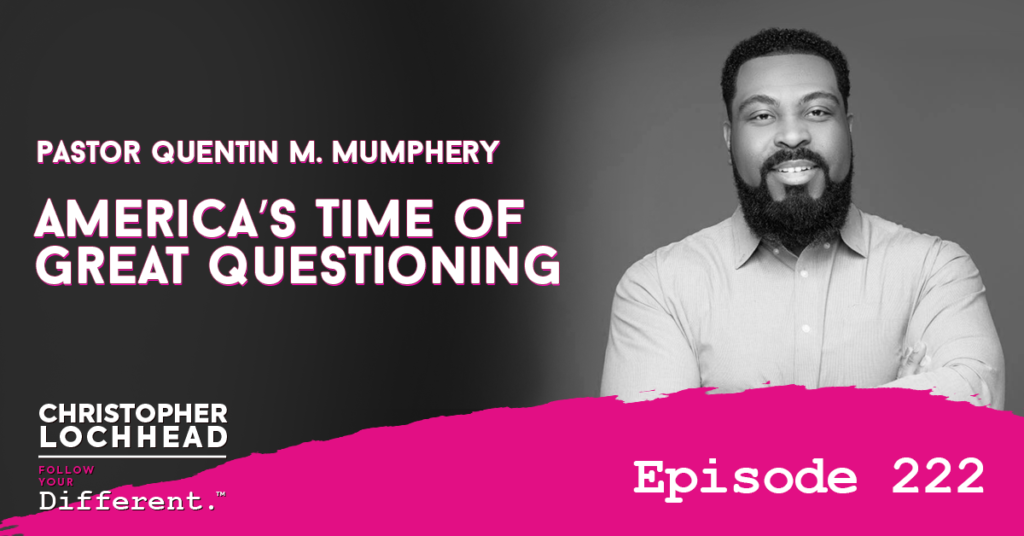
Podcast: Play in new window | Download (Duration: 1:42:38 — 70.5MB) | Embed
Subscribe: Apple Podcasts | Spotify | Pandora | RSS | More
We are living in a time of historical, cultural, and racial consequence in the United States. People are asking very big questions about fundamental design points around their life. How do they want to work, live and play? Many thoughtful Americans are also asking themselves about our country’s design, and the kind of future they want for themselves and their family.
In this episode of Follow Your Different, we talk about all these and more with Pastor Quentin Mumphery. Pastor Quentin is a native of Chicago’s South Side and is the founder and senior pastor at New Hope covenant church.
Pastor Quentin is also the co-author with Eddie Yun, Pastor Dave Ferguson and myself, of a Harvard Business Review post about justice deposits, encouraging people, people in companies for that matter to move some of their cash deposits to black owned banks. If you want to learn more about it, stay tuned to this episode.
Being a Pastor in Today’s Society
Pastor Quentin shares how he grew up on the south side of Chicago, and some of his influences growing up. He muses that Chicago has always been a great yet troubled city, and has the best and worst of everything.
Everyone is exposed to the same extremes, though their reactions can be quite different. People clamor for change and a better future, while at the same time focus on finding ways to live at the moment. This dynamic tension of sorts is the reality that each of us is living with at the moment, and which Pastor Quentin hopes to understand.
“I’m a believer that people want the best, but sometimes do the worst. And I think that part of that is just the human condition.” – Pastor Quentin Mumphery
Serving God in Different Ways
Pastor Quentin talks about his inspirations in church, and how they approach serving the Lord and the community in different ways. As a teen in a youth ministry of the church, they would go where the hurting people were. Whether it was the best place in town or places where you wouldn’t normally expect a man of cloth to be in, they would go and pray.
“Part of what I believe it means to be a man of God and a man of faith is that we don’t just run and turn our head when trouble is there. The scriptures call us to be soft and light. And I believe part of that is showing up where light is needed.” – Pastor Quentin Mumphery
When given the example of St. Christopher, Pastor Quentin wholeheartedly agrees and states that there are a lot of ways you can serve God. You just have to find the best way you can do it.
Taking Things into Perspective
Pastor Quentin talks about the theological and philosophical sides of being good or bad. We often see people do bad things and justify them because they are doing it for a good cause. But according to who though? If you flip that and see it from the other side’s perspective, you’re the bad one doing the awful things to them.
“I tell this to people all the time, too. I said, every one of us are the villain in someone’s story. The thing is when we tell our own story, we’re always the hero. We’re always the hero, right? Anything bad to happen, it’s always someone did this to me.” – Pastor Quentin Mumphery
So Pastor Quentin tells us to keep this question in mind: “Who determines whether you’re good?” It will help in considering other people’s perspective, and prevent the mindset of always having the moral high ground on things.
To hear more from Pastor Quentin Mumphery and his questions for America, download and listen to this episode.
Bio
A native of Chicago’s south side, Pastor Quentin M. Mumphery is the Founder and Senior Pastor of New Hope Covenant Church, A contemporary urban church with classic experience in a modern environment, located on Chicago’s south east side.
Pastor Mumphery previously served as Lead Pastor of Windsor Park Lutheran Church, as well as Associate Pastor of New Life Covenant Church Southeast, under the leadership of Pastor John Hannah. Pastor Mumphery received his foundation in the Kingdom at the Salem Baptist Church of Chicago, where he accepted his call to ministry as a teen in the Youth Church.
In addition to his pastoral role and civic leadership, his servitude extends extensively in the field of education. Pastor Mumphery serves as a Vice President for a national education management organization, working with high-risk youth in many of the most challenged communities in the country. Pastor Mumphery is a graduate of Whitney M. Young Magnet H.S and the University of Illinois at Chicago. He also received his Master’s degree from North Park Theological Seminary.
A prolific preacher and teacher, Pastor Mumphery is committed to excellence in preaching through strong biblical exposition, powerful demonstration of the Holy Spirit’s power, as well as relevant ministry outside of the walls of the church to uphold the cause of the poor and oppressed.
Links
Website: New Hope Covenant Church
Follow Pastor Quentin Mumphery: New Hope Covenant’s Pastor
We hope you enjoyed this episode of Follow Your Different™! Christopher loves hearing from his listeners. Feel free to email him, connect on Facebook, Twitter, Instagram, and subscribe on iTunes!
112 Maybe The Only Career Advice That Matters
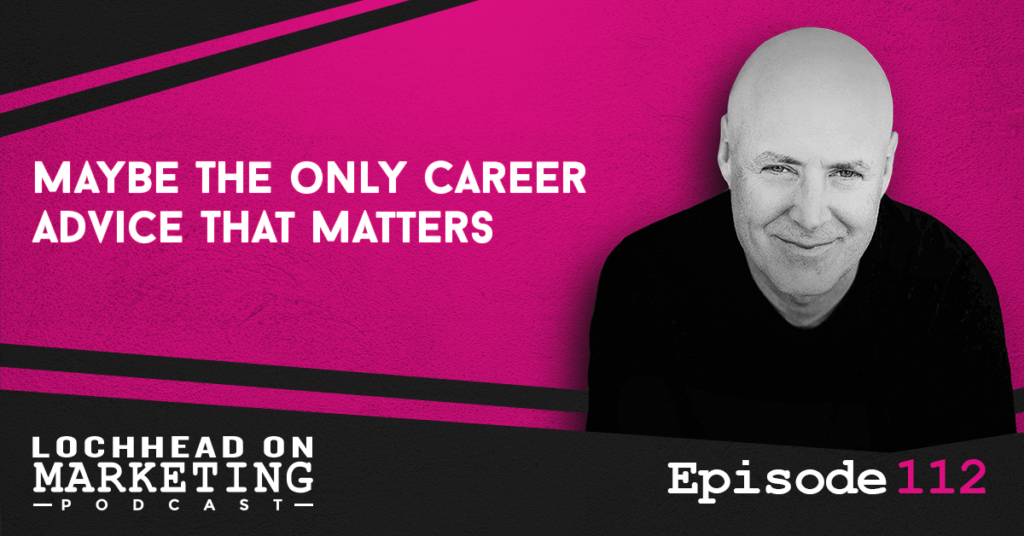
Podcast (lochheadonmarketing): Play in new window | Download (Duration: 7:16 — 5.0MB) | Embed
Subscribe: Apple Podcasts | Spotify | RSS | More
These days, we hear a non-stop barrage of career advice. Some of them is good, but a lot of them are not. In this episode of Lochhead on Marketing, let’s talk about what might be the only career advice that matters.
Relationships, Marriages, and Divorce
By now, you may have heard of Bill and Melinda Gates are getting a divorce, and that Jeff Bezos and McKenzie Scott got divorced a couple of years ago. You might be wondering why we brought this up.
You see, these people are some of the wealthiest entrepreneurs and biggest philanthropists ever. According to hustle porn stars and business advice gurus, these are the people we should aspire to be. Yet for whatever reason, their marriage didn’t work out.
While there is merit to saying that sometimes divorcing doesn’t mean it failed, but just ran its likely course, it does make you wonder.
“The reality is if your personal life isn’t working, all the money in the world can’t save you.” – Christopher Lochhead
Living a Legendary Life
Which brings us to the second point: the decision about who your significant other or partner is going to be is arguably the biggest decision that you will make.
Because when it works, it is the foundation for designing a legendary life. If it doesn’t work, everything just seems out of place.
So we should ask ourselves: are we designing our life around our work or our work around our life?
While this is not necessarily a binary decision, most people would want to live a legendary life.
“I think what most of us want is we want to have a legendary life. And whether we’re working or in our marriage, our primary relationship or with our family and friends, we want to have what you might think of as a 360-degree life.” – Christopher Lochhead
Getting Things Right
Herein lies the question: is it possible to get everything right all the time?
Of course not. Though in general, it is what most of us are trying to do. In that context, our work sits inside of our non-work life.
So if you’re somebody who’s been working too hard, work 80 to 100 hours a week and travel two to four hundred thousand miles a year on a plane, here’s a career advice. Ask yourself: what am I working for?
We’re living at a time of massive personal self-examination that has been brought on by the pandemic. We recently wrote a Category Pirates about this, how people are going YOLO, YOLO being an expression for you only live once.
Now is a time for consideration. And I think what these high-profile divorces tell us as somebody who’s been divorced myself, is that it’s time to consider our work in the context of our lives.
Links
A Very “Different” Approach To A Legendary Career: YOLO And Achieve Your Personal IPO
Bio
Christopher Lochhead is a #1 Apple podcaster and #1 Amazon bestselling co-author of books: Niche Down and Play Bigger.
He has been an advisor to over 50 venture-backed startups; a former three-time Silicon Valley public company CMO and an entrepreneur.
Furthermore, he has been called “one of the best minds in marketing” by The Marketing Journal, a “Human Exclamation Point” by Fast Company, a “quasar” by NBA legend Bill Walton and “off-putting to some” by The Economist.
In addition, he served as a chief marketing officer of software juggernaut Mercury Interactive. Hewlett-Packard acquired the company in 2006, for $4.5 billion.
He also co-founded the marketing consulting firm LOCHHEAD; the founding CMO of Internet consulting firm Scient, and served as head of marketing at the CRM software firm Vantive.
We hope you enjoyed this episode of Lochhead on Marketing™! Christopher loves hearing from his listeners. Feel free to email him, connect on Facebook, Twitter, Instagram, and subscribe on Apple Podcast! You may also subscribe to his newsletter, The Difference, for some amazing content.

